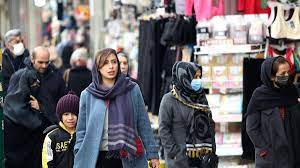TEHRAN (AFP): One of Iran’s top clerics, Nasser Makarem, has spoken out against the use of violence to force women into wearing the veil.
Iran has witnessed a wave of nationwide protests since the Sept. 16 death of Mahsa Amini, a 22-year-old ethnic Kurd, after her arrest for an alleged breach of the regime’s dress code for women.
Hundreds of people have been killed, including dozens of security personnel, and thousands have been arrested in the protests, which authorities generally refer to a “riots.”
Makarem, a prominent cleric, said that he “does not consider violence and pressure to be effective in the hijab issue.”
“The president and ministers should know that they are in a difficult situation; it is true the enemy is very active, but not all avenues are closed,” he said, quoted by the IRNA news agency.
“The hijab issue is currently linked to political issues, and some people say that if they can remove the veil, the regime’s system will be weakened,” the cleric added.
Iran’s Tourism and Heritage Minister Ezzatollah Zarghami earlier called for greater tolerance toward women not wearing mandatory headscarves.
Earlier this month, however, Iran’s prosecutor general had called for police to “firmly punish any hijab violators.”
Iran has accused its foreign foes, including the US and Israel, of fomenting the protests that erupted over Amini’s death in the custody of the country’s morality police.
The cleric’s remarks came as Israeli President Isaac Herzog urged the NATO military alliance to toughen its approach to Iran, as Tehran supplies drones to Russia for its war on Ukraine.
“The crisis there goes beyond the boundaries of Ukraine, with the Iranian threat now at Europe’s doorstep,” Herzog said on a visit to NATO headquarters in Brussels.
“The illusion of distance can no longer hold. NATO must take the strongest possible stance against the Iranian regime including through economic, legal and political sanctions and credible military deterrence.”
The figurehead leader became on Thursday the first Israeli president to brief NATO’s main decision-making body.
“A terrible war continues to cause needless human suffering and compromise the well-being and welfare of millions,” Herzog said.
“Our hearts continue to go out to the people of Ukraine as they defend their homes and their country,” he said.
NATO chief Jens Stoltenberg said he had discussed “our support for Ukraine” with Herzog.
“The Ukrainian people are bravely defending their homeland and NATO allies and partners are helping to support their right to self defence,” he said.
The NATO secretary general said Herzog’s visit was a sign of the US-led alliance’s “deepening partnership” with Israel.
Herzog pointed to bolstering cooperation on cyber-security, threats from space, drones, and energy resilience.
He said the two sides were slated to sign a new cooperation agreement “in just a couple of months, which lengthens the period of cooperation and expands it reach.”







